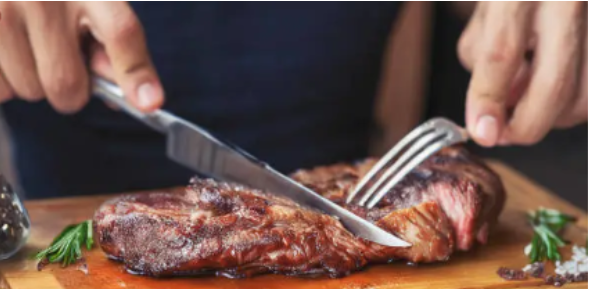Nutrition Blog – The Truth of Social Media Diets
Oct 2 / CATEGORY: Nutrition
Estimated Reading Time:
2 minutes, 56 seconds
Social media is home to all kinds of trends, including diet and lifestyle. Keep reading as we break down the diets that your favorite (or least favorite) influencers have been promoting — and uncover what is true and what is just hype.
The Carnivore Diet
Breakfast: Eggs and bacon
Lunch: Ribeye steak with bone marrow
Dinner: Pork chops cooked in butter
Dessert and Snacks: Beef jerky and butter cubes

The carnivore diet limits consumption to animal products like meat, eggs, fish and poultry. Carnivore influencers claim the diet boosts muscle growth, supports weight loss, and even treats chronic diseases. Is there truth in these claims?
1. Muscle growth: Optimal protein intake is essential for muscle repair andg rowth. However, other nutrients such as carbs—which are excluded in this diet—are essential for energy and recovery.
2. Weight loss: Cutting carbs may lead to fast weight loss initially, but it’s often not sustainable. Many people regain the weight (and sometimes more) once they resume normal eating.
3. Treatment of Chronic Diseases: There’s currently no strong or conclusive scientific evidence that eating only meat helps prevent or treat chronic diseases. This diet raises concerns for the development of other detrimental diseases and health conditions.
In the end, the carnivore diet has limited benefits but many risks because of its highly restrictive nature. Enjoy things like burgers, but do not fear adding a bun for satisfaction and energy, and tomatoes and lettuce for nutrients and fiber.
Protein Maxxing
Protein pancakes. Protein ice cream. Protein everything. Social Media worships protein and influencers promote it as a “fit food” that will magically build muscle.
Protein is an essential nutrient that plays a vital role in health, but here’s the truth:
- While protein is essential, more is not always better.
- The recommended protein intake for an average individual is 0.8g/kg of bodyweight
per day, and up to 1.6-1.8 g/kg for strength and power athletes. - The social media ‘gram per pound of body weight’ being promoted is not rooted in
science and results un unnecessary exclusion of other health-promoting foods.
Great protein tips to follow include ensuring there is a protein source at every meal and getting protein from a variety of plant and animal sources.
Most individuals meet protein requirements without thinking about it. Don’t stress about ‘proteinifying’ all your favorite foods—it is ok for a cookie to just be a cookie. Learn more about protein and protein needs here.

Raw Diets
Raw diets—eating mostly unprocessed, uncooked foods— have (once again) taken off on social media. Advocates claim raw unprocessed food contains maximum nutrients and health benefits and cooking destroys the nutrients. While it is true that a raw
diet can have potential benefits such as increased fiber intake and antioxidants, be wary of:
- Safety risks: Pasteurization is key to killing harmful bacteria in foods like dairy, juices, and nuts for nut butters. Raw diets that skip this step increase the risk of foodborne illness, especially Salmonella.
- Cost and Convenience: Eating fully raw can be expensive and impractical. Requiring extensive food preparation and grocery shopping, a quick, adequate bite on the go or bowl of cereal is restricted. Dining out also becomes difficult.
- Nutrient Deficiency: There are certain nutrients that become more bio-available when food is cooked or processed. A raw-only diet can be deficient in some essential vitamins and minerals.
Takeaway

Social media diets come with bold claims and flashy results. Influencers on their “health journeys” promise a certain outcome but consider if the extremes they are proposing are realistic and will properly fuel your body.
Many of these diets rely on restrictions, eliminations, and swaps that are unrealistic for most people. If you are craving pancakes, it is OK to eat them without cottage cheese, egg whites, and protein powder. There is no shame in eating what fits your lifestyle, feels good, and most importantly, tastes good.
This post was co-written by:
Jessie Furman, MS, RDN, LD/N and Adaline Boissy, BS
Jessie is a Registered Dietitian and Assistant Director for Fitness & Wellness at the University of Florida’s Department of Recreational Sports, where she does individual nutrition counseling and coaching with the UF community. Follow her on Instagram for more nutrition tidbits.
Adaline is the Program Assistant with Nutrition Services at the Department of Recreational Sports. She is a 3rd year dietetics major.
Bibliography
1.
Is the Carnivore Diet Actually Healthy? | St Vincents Medical Center. Stvincents.org. Published 2025. https://stvincents.org/about-us/news-press/news- detail?articleId=61470&publicid=395
2.
Clinic C. Raw Food Diet: Is It Healthier? Cleveland Clinic. Published January 11, 2021. https://health.clevelandclinic.org/raw-food-diet-is-it-healthier
3.
Zeratsky K. Are high-protein diets safe? Mayo Clinic. Published July 19, 2022. https://www.mayoclinic.org/healthy-lifestyle/nutrition-and-healthy-eating/expert- answers/high-protein-diets/faq-20058207
